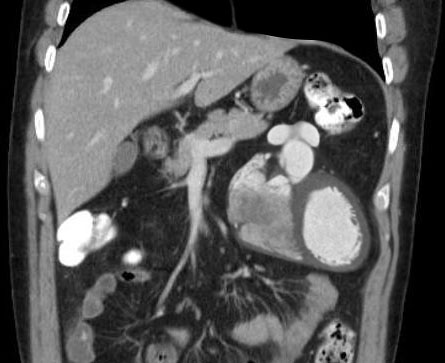On April Fools’ Day 10 years ago, radiologist Matt Skalski took part in a website’s annual challenge to prank the radiology community by posting the case of a man with “ectopia cordis interna,” or “Tin Man Syndrome.” Unlike the fictitious metal character from the Wizard of Oz, Skalski’s satirical patient had a heart — in his abdomen.
Now a group of researchers say they encountered the disease in real life, in a 22-year-old patient they claim has “no significant medical history.”
The researchers based in Iraq published their “rare case report” in Medicine in July.
A sleuth came across the paper and, after running the images through Google Lens, discovered the April Fools’ publication in Radiopaedia, a peer-reviewed resource for the field. The sleuth, a physician who has asked to remain anonymous, sent Retraction Watch the tip out of concern the “misrepresentation could mislead healthcare providers, potentially leading to incorrect surgical planning or treatment for patients with similar conditions.”
The sleuth pointed out “identical anatomical features” in the 2015 Radiopaedia case and the 2025 Medicine paper, including patterns in air and bone “which differ substantially even within the same person” between scans – a red flag the scans were not of different people.
We asked David Sanders, an image expert and biologist at Purdue University in West Lafayette, Ind., to take a look at the X-ray scans included in each paper. He told us the images “indubitably originate from the same source,” citing the label — especially the uppercase N — in the upper right hand corner of each of the frontal scans.
“The overlap in the images otherwise is so extensive as to be impossible to represent different patients,” Sanders told us.
Sanders also pointed out the first reference of the 2025 paper, which the authors use to define the condition, is a paper about ectopia cordis, not ectopia cordis interna. Ectopia cordis is a very rare condition where the heart grows outside of the body. Few babies born with it survive.


The paper’s second citation defines “ectopiacordis interna” without a source. In other words, “at least one other set of authors was taken in by the hoax,” Sanders said.
Sanders found two other sources that directly cite the April Fools’ paper, one from 2021 and a 2024 YouTube video explaining Tin Man Syndrome. He also discovered one other “case report” which he said “irrefragably” copies images from the hoax.
Skalski, the author of the satirical paper, said he also believes the authors used his case. “Not sure how it made it through peer review or why anyone in their right mind would think to publish it,” he told us.
The authors, however, maintain the validity of their case. Ashraf Basalilah, corresponding author of the article and a researcher at Hadhramaut Hospital in Yemen, called the similarities to the Radiopaedia case “entirely coincidental.”
Basalilah sent us redacted versions of what he said were the patient’s file, ethical approval paperwork, hospital and radiology department verification letter and patient consent form. He told us he couldn’t share photos of the patient’s body or face for consent reasons.
This case report is one of six Basalilah has published in Medicine this year.
He also shared that he found another case report of the condition, linking to the case report Sanders also identified. That report includes the April Fools’ article in its citations and includes excerpts from it without noting the article was a parody, including that a physician named “Nohear Lubdub” described a similar case in the 1800s.
Several emails to Medicine’s listed contact email as well as to editors Megan Larkin and Maya Workowski at Wolters Kluwer, the journal’s publisher, went unanswered. Basalilah told us the authors were “cooperating fully with the editorial team” at the journal.
Like Retraction Watch? You can make a tax-deductible contribution to support our work, follow us on X or Bluesky, like us on Facebook, follow us on LinkedIn, add us to your RSS reader, or subscribe to our daily digest. If you find a retraction that’s not in our database, you can let us know here. For comments or feedback, email us at [email protected].
Take a look
https://www.medicaldaily.com/huang-rongming-man-born-heart-abdomen-undergoes-corrective-surgery-253579
Ehm, yes, that is ectopia cordis. The hoax paper is about ectopia cordis interna, where the heart is not bulging outside the body but fully located in the abdomen.
The original is pretty funny. It took me a minute to catch on to poor Dr. Nohear Lubdub.
This paper has now been retracted.
This paper, along with several others from the same group, has now been retracted.